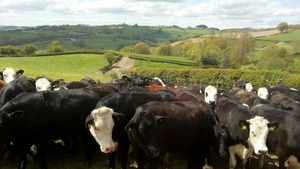Case study 2: United Kingdom: Herbal or diverse leys use as service crops and valorised through grazing
Cluster 1: Service crops
The use of leys with grazing livestock is a dying practice, but one offering potentially huge benefits to livestock and arable farms alike. Including leys within an arable system can be a solution for problems ranging from soil condition to weeds, but grass itself is – to an arable farm – of limited value. A group of six farms from across the country who have, use or are establishing leys with livestock, came together under DiverIMPACTS case study 2 to explore further the dynamics of using livestock to valorise leys within their own systems, consider the benefits it offers and determine how to make it work from a practical and business perspective.

What were the main problems underlying the emergence of the case study?
There are two main reasons stimulating farmers to turn to leys. First, farmers are increasingly recognising deteriorations in the condition of their soil stemming from continuous arable cropping. Alongside this there are the challenges of changing weather patterns leaving damaged soils susceptible to drought and/or waterlogging. The second issue is inputs. There are business risks associated with relying on inputs (fertilisers and/or pesticides), especially considering the increasing emergence of weeds like blackgrass that are resistant to herbicide treatments.
How was the problem addressed and which actors were involved?
Leys may offer a way to reduce inputs – by providing soil fertilisation and tackling weeds – and to improve soil condition, but they also represent time lost from arable cropping. Using the ley to keep livestock, effectively getting a ‘crop’ from the ley years too, offers a way to make leys more attractive to arable farmers and may offer additional benefits to a stockless ley.
Six farmers already using leys with livestock formed a core case study group, each exploring select areas of leys and livestock within their farm system over the past five years. The six farmers represent a wide range of farming types, from mixed farms to livestock or arable specialists, but all feature leys as part of their rotation. Over the course of the project, they explored the benefits of leys including using some basic measurements and trials on their own farms.
The six farms also reached out and engaged with other farms and innovators outside the group. This expanded their learning, identified new inspirations and also offered an opportunity for them to act as examples to other farmers potentially interested in the practice.
Solution investigated
Leys as service crops have the potential to improve the health of soils and reduce the need for inputs, improving the global sustainability of the farming systems. Using livestock to valorise these leys may provide a way to add further benefit.
Expected outcome
These service crops would support the improvement of soils on farms, offering benefits into the arable rotation. However, they would also support the direct generation of income through facilitating the production of livestock, through provision of grazing, for example.
Relevance to the DiverIMPACTS goals
The case study focused on ways to diversify cropping systems by incorporating leys with livestock for sustainability and soil fertility and looked at opportunities and challenges in ensuring profitability of both the arable and livestock aspects of the rotations.
Case study legacy
The group of farmers engaged in this case study were all very keen on diverse leys being part of land management systems. However, their approaches to farming were diverse including conventional, organic and biodynamic, and their experience with diverse leys ranged from none to 20 years. The diversity in farmer identity and experience inhibited the development of a cohesive group with a joint narrative or direction with each farmer pursuing their own goals. The case study will therefore not continue beyond the end of the project. Nevertheless, at an individual farm level, diverse leys are now a firmly established and important component of all the participating farmers’ systems with one conventional farmer also converting to organic where diverse leys are now a linchpin of the newly-developed mixed system. An open event for farmers on the benefits of diverse leys was hosted by a case study member, with scientists and farmers speaking of the value of herbal leys.
Further information
Links
- agricology.co.uk: Livestock on diverse leys: a return to the past for a promising future
Case study team
- Lindsay Whistance, DLO, case study leader
- Abel Villa, ORC, case study monitor
 tap and then scroll down to the Add to Home Screen command.
tap and then scroll down to the Add to Home Screen command.